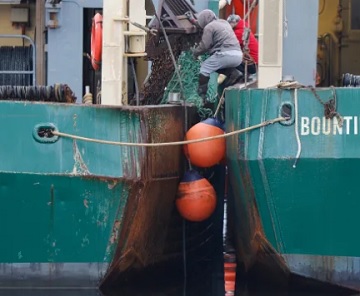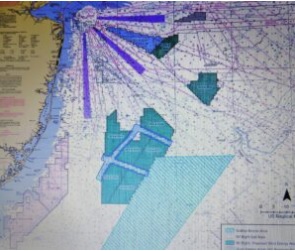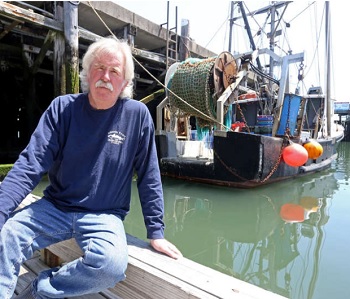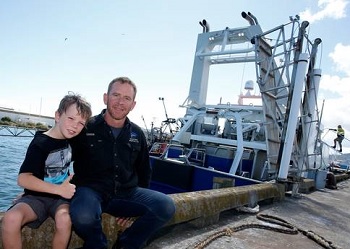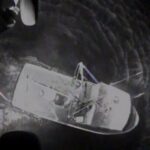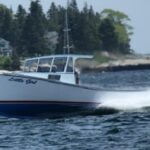Tag Archives: RODA
NOAA Hired an Anti-Wind Activist as Its Top Lawyer
 The National Oceanic and Atmospheric Administration has hired a new general counsel who was, until recently, pursuing legal challenges to offshore wind farms on behalf of the fishing industry, Heatmap has learned. NOAA’s Fisheries division, also known as the National Marine Fisheries Service, regulates species protection within U.S. waters. Activists have sought to persuade the Trump administration to review the division’s previous and future approvals for offshore wind projects that interact with endangered marine life, which would be a huge win for the “wind kills whales” movement. Enter Anne “Annie” Hawkins, NOAA’s new general counsel, who comes to the agency after serving for years as the executive director of the Responsible Offshore Development Alliance, an organization founded in 2017 that has fought offshore wind projects on behalf of the fishing industry. Hawkins stepped down as RODA’s executive director last fall, shortly after Trump won the presidential election. Links, more, >>CLICK TO READ<< 15:22
The National Oceanic and Atmospheric Administration has hired a new general counsel who was, until recently, pursuing legal challenges to offshore wind farms on behalf of the fishing industry, Heatmap has learned. NOAA’s Fisheries division, also known as the National Marine Fisheries Service, regulates species protection within U.S. waters. Activists have sought to persuade the Trump administration to review the division’s previous and future approvals for offshore wind projects that interact with endangered marine life, which would be a huge win for the “wind kills whales” movement. Enter Anne “Annie” Hawkins, NOAA’s new general counsel, who comes to the agency after serving for years as the executive director of the Responsible Offshore Development Alliance, an organization founded in 2017 that has fought offshore wind projects on behalf of the fishing industry. Hawkins stepped down as RODA’s executive director last fall, shortly after Trump won the presidential election. Links, more, >>CLICK TO READ<< 15:22
Fishing industry asks Supreme Court to hear case against Vineyard Wind
 A national fishing industry group and conservation think tank have petitioned the U.S. Supreme Court to take up their lawsuits challenging the approval of the Vineyard Wind project, which has been under construction since 2023. The lobbying group, Responsible Offshore Development Alliance (RODA), sued the lead government regulator of offshore wind in early 2022, alleging the agency violated several acts, including those to protect existing ocean users and endangered species. At the crux of RODA’s appeal to the Supreme Court is the language of the Outer Continental Shelf Lands Act, and particularly, how the federal government interpreted it. more, >>CLICK TO READ<< 06:52
A national fishing industry group and conservation think tank have petitioned the U.S. Supreme Court to take up their lawsuits challenging the approval of the Vineyard Wind project, which has been under construction since 2023. The lobbying group, Responsible Offshore Development Alliance (RODA), sued the lead government regulator of offshore wind in early 2022, alleging the agency violated several acts, including those to protect existing ocean users and endangered species. At the crux of RODA’s appeal to the Supreme Court is the language of the Outer Continental Shelf Lands Act, and particularly, how the federal government interpreted it. more, >>CLICK TO READ<< 06:52
Broken blades, angry fishermen, and rising costs slow offshore wind
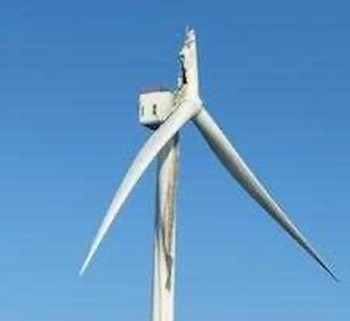 The collapse of a giant wind turbine blade off the Massachusetts coast confirmed Peter Kaizer’s worst fears about the dangers a new clean energy business could pose to fishermen like him. Jagged pieces of fiberglass and other materials from the shattered blade drifted with the tide, forcing officials to close beaches on Nantucket and leaving Kaizer worried about the threat the fragments might pose to his vessel and other fishing boats, especially at night when the debris would be harder to avoid. “All these small boats could be subject to damage,” Kaizer said. “Everyone wants this green legacy, but at the cost of what?” Full article. more, >>CLICK TO READ<< 07:58
The collapse of a giant wind turbine blade off the Massachusetts coast confirmed Peter Kaizer’s worst fears about the dangers a new clean energy business could pose to fishermen like him. Jagged pieces of fiberglass and other materials from the shattered blade drifted with the tide, forcing officials to close beaches on Nantucket and leaving Kaizer worried about the threat the fragments might pose to his vessel and other fishing boats, especially at night when the debris would be harder to avoid. “All these small boats could be subject to damage,” Kaizer said. “Everyone wants this green legacy, but at the cost of what?” Full article. more, >>CLICK TO READ<< 07:58
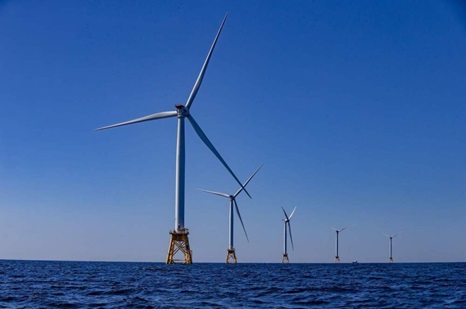
Mass. and Rhode Island pick 3 new wind projects, with less power than originally sought
Massachusetts and Rhode Island announced the winners of their joint offshore wind auction on Friday. While this total is less than half of what the states originally sought to procure, it helps bring them closer to their legally binding offshore wind targets. Friday’s news comes after nearly two years of economic tumult in the industry, when developers up and down  the East Coast canceled contracts for wind projects, saying they could not make them financially viable because of inflation, higher interest rates and supply chain problems. Still, not everyone is celebrating the news. Jerry Leeman, CEO of the New England Fishermen’s Stewardship Association, said he was “shocked” that the New England states are awarding more contracts less than two months after a blade broke off a Vineyard Wind Project turbine. In mid-July, the blade sent tons of fiberglass and foam debris into the ocean. Much of it washed up on the south side of Nantucket, and several beaches had to close while the material was cleaned up. more, >>CLICK TO READ<< 08:20
the East Coast canceled contracts for wind projects, saying they could not make them financially viable because of inflation, higher interest rates and supply chain problems. Still, not everyone is celebrating the news. Jerry Leeman, CEO of the New England Fishermen’s Stewardship Association, said he was “shocked” that the New England states are awarding more contracts less than two months after a blade broke off a Vineyard Wind Project turbine. In mid-July, the blade sent tons of fiberglass and foam debris into the ocean. Much of it washed up on the south side of Nantucket, and several beaches had to close while the material was cleaned up. more, >>CLICK TO READ<< 08:20

‘So-called expert bureaucrats’: Fishermen rip Sen Warren’s new plan to ‘silence’ them
America’s seafood leaders are pushing back on new plans from Democrats on Capitol Hill to revive a legal doctrine that fishermen say threatens to “silence” them. On Tuesday, Sen. Elizabeth Warren, D-Mass., led several of her Democrat colleagues in introducing the Stop Corporate Capture Act (SCCA), which she says is aimed at stopping corporations from “hijacking” the government. With the new threat of the Chevron doctrine finding permanence in federal law, New England fishermen are crying foul and pointing to the recent offshore wind disaster wreaking havoc on the Massachusetts island of Nantucket as a prime example of why lawmakers should not give “expert bureaucrats” power over their industry. Photos, more, >>CLICK TO READ<< 06:45
Fishermen Join Lawsuit Against Vineyard Wind After Blade Failure
 The New England Fishermen’s Stewardship Association (NEFSA) has called for the First U.S. Circuit Court of Appeals to reconsider the dismissal of a lawsuit against the Department of the Interior regarding the safety of Vineyard Wind’s turbines. The case, RODA v. Department of the Interior, is scheduled for oral arguments on Thursday. Jerry Leeman, CEO of NEFSA, highlighted recent issues related to the Vineyard Wind project, particularly a blade malfunction that resulted in debris being scattered across important fishing areas. “The Responsible Offshore Development Alliance (RODA) put the government on notice over two years ago that Vineyard Wind’s turbines aren’t safe. The recent blade disaster has scattered debris over a huge swath of historic fishing grounds, creating serious hazards for mariners and marine life,” Leeman stated. more, >>CLICK TO READ<< 07:59
The New England Fishermen’s Stewardship Association (NEFSA) has called for the First U.S. Circuit Court of Appeals to reconsider the dismissal of a lawsuit against the Department of the Interior regarding the safety of Vineyard Wind’s turbines. The case, RODA v. Department of the Interior, is scheduled for oral arguments on Thursday. Jerry Leeman, CEO of NEFSA, highlighted recent issues related to the Vineyard Wind project, particularly a blade malfunction that resulted in debris being scattered across important fishing areas. “The Responsible Offshore Development Alliance (RODA) put the government on notice over two years ago that Vineyard Wind’s turbines aren’t safe. The recent blade disaster has scattered debris over a huge swath of historic fishing grounds, creating serious hazards for mariners and marine life,” Leeman stated. more, >>CLICK TO READ<< 07:59
Harris: No offshore wind turbines
 Warning of dire consequences if offshore wind industrialization is allowed off Maryland’s Atlantic coast, three legislators called on experts to bolster their call to halt construction of wind turbines off the mid-Atlantic coast. Harris was joined by New Jersey Congressmen Jeff Van Drew (R) and Chris Smith (R). Six experts testified and answered questions from the legislators. whose districts “are directly impacted” by “offshore wind industrialization,” according to news releases issued by the congressmen’s offices. Harris doubted that “the average person would be willing to pay the extra taxes and extra rates in order to develop a source of energy that … is roughly four times as expensive as what your current source of energy is,” he said. “That impacts everyone whether or not you live on the Shore.” 12 photos, more, >>click to read<< 06:55
Warning of dire consequences if offshore wind industrialization is allowed off Maryland’s Atlantic coast, three legislators called on experts to bolster their call to halt construction of wind turbines off the mid-Atlantic coast. Harris was joined by New Jersey Congressmen Jeff Van Drew (R) and Chris Smith (R). Six experts testified and answered questions from the legislators. whose districts “are directly impacted” by “offshore wind industrialization,” according to news releases issued by the congressmen’s offices. Harris doubted that “the average person would be willing to pay the extra taxes and extra rates in order to develop a source of energy that … is roughly four times as expensive as what your current source of energy is,” he said. “That impacts everyone whether or not you live on the Shore.” 12 photos, more, >>click to read<< 06:55
Offshore Wind and the Stress on Commercial Fishermen
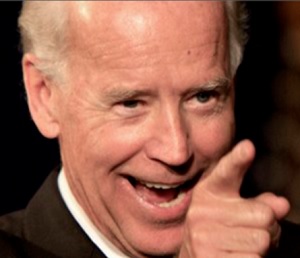 Congressional Republicans are sounding the Mayday alarm this weekend to the grave challenges commercial fishermen face resulting from the Biden administration’s offshore wind agenda. Offshore wind development is placing enormous stress on the American commercial fishing fleet, which may not survive these challenges. A trio of coastal lawmakers, Reps. Andy. Harris (R-Md.), Chris Smith (R.-N.J.), and Jeff Van Drew (R-N.J.) will explore offshore wind farm interactions at an upcoming hearing, which their colleagues and the public should heed. President Joe Biden casts himself as a friend to American workers, but his poor treatment of fishermen and their communities puts the lie to this claim. Biden’s plan to produce 30 GW of offshore wind energy by the year 2030 is based solely on political goals, not any true scientific investigation of our ocean’s offshore ecosystems. The science is unresolved. Coastal economies are forgotten. Energy and food security questions are ignored. And that’s just for starters. more, >>click to read<< 08:16
Congressional Republicans are sounding the Mayday alarm this weekend to the grave challenges commercial fishermen face resulting from the Biden administration’s offshore wind agenda. Offshore wind development is placing enormous stress on the American commercial fishing fleet, which may not survive these challenges. A trio of coastal lawmakers, Reps. Andy. Harris (R-Md.), Chris Smith (R.-N.J.), and Jeff Van Drew (R-N.J.) will explore offshore wind farm interactions at an upcoming hearing, which their colleagues and the public should heed. President Joe Biden casts himself as a friend to American workers, but his poor treatment of fishermen and their communities puts the lie to this claim. Biden’s plan to produce 30 GW of offshore wind energy by the year 2030 is based solely on political goals, not any true scientific investigation of our ocean’s offshore ecosystems. The science is unresolved. Coastal economies are forgotten. Energy and food security questions are ignored. And that’s just for starters. more, >>click to read<< 08:16
Massachusetts wind farm dodges lawsuits over environmental, fishing concerns
 A U.S. judge has rejected challenges to federal environmental permits and construction approvals for a $4 billion offshore wind farm near Massachusetts, which commercial fishing groups have claimed will harm whales and impair their businesses. U.S. District Judge Indira Talwani in Boston on Thursday tossed the final two federal district court lawsuits directly challenging the Vineyard Wind project roughly 15 miles south of Martha’s Vineyard, which would be the first commercial-scale offshore wind farm in the country. Representatives for the plaintiffs and the Army Corps didn’t immediately respond to requests for comment on Friday. The Interior Department, which oversees BOEM, declined to comment. >>click to read<< 09:11
A U.S. judge has rejected challenges to federal environmental permits and construction approvals for a $4 billion offshore wind farm near Massachusetts, which commercial fishing groups have claimed will harm whales and impair their businesses. U.S. District Judge Indira Talwani in Boston on Thursday tossed the final two federal district court lawsuits directly challenging the Vineyard Wind project roughly 15 miles south of Martha’s Vineyard, which would be the first commercial-scale offshore wind farm in the country. Representatives for the plaintiffs and the Army Corps didn’t immediately respond to requests for comment on Friday. The Interior Department, which oversees BOEM, declined to comment. >>click to read<< 09:11
Eye-opening report by NOAA on fisheries and offshore wind farms
 Offshore wind-energy installations “wind farms” are expanding along the East Coast of the United States as a way to increase the use of renewable energy, but these installations are not without their own significant impacts on marine resources and their associated fisheries. They have innocuous-sounding names such as Revolution Wind, Sunrise Wind, Mayflower Wind Phase 1 and Park City Wind. The Bureau of Ocean Energy Management is the federal agency responsible for offshore-energy exploration and development in the US. To date, BOEM has leased approximately 1.7 million acres in the northeast and mid-Atlantic US outer continental shelf for offshore wind development, with approximately 25 active leases from Cape Cod to Cape Hatteras. And in late August, BOEM and the Department of the Interior announced that they will hold the first offshore wind-energy lease sale in the Gulf of Mexico. >>click to read<< 10:30
Offshore wind-energy installations “wind farms” are expanding along the East Coast of the United States as a way to increase the use of renewable energy, but these installations are not without their own significant impacts on marine resources and their associated fisheries. They have innocuous-sounding names such as Revolution Wind, Sunrise Wind, Mayflower Wind Phase 1 and Park City Wind. The Bureau of Ocean Energy Management is the federal agency responsible for offshore-energy exploration and development in the US. To date, BOEM has leased approximately 1.7 million acres in the northeast and mid-Atlantic US outer continental shelf for offshore wind development, with approximately 25 active leases from Cape Cod to Cape Hatteras. And in late August, BOEM and the Department of the Interior announced that they will hold the first offshore wind-energy lease sale in the Gulf of Mexico. >>click to read<< 10:30
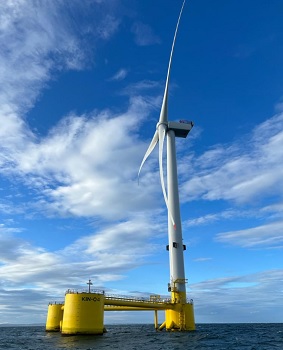
Leeman: Maine must hit pause on offshore wind turbines
You wouldn’t buy a house without an inspection, so why would we fill the Gulf of Maine with wind turbine superstructures without understanding how they interact with the marine environment? Offshore wind energy features too many unknowns to proceed at this point with widescale ocean industrialization. That’s why my organization, the New England Fishermen’s Stewardship Association (NEFSA) has joined with partner organizations to call on state and federal authorities to reset our renewable energy policy. The state of Maine is developing a floating offshore wind research array at a 15-square-mile site in the Gulf of Maine. >click to read< 08:17

Fishermen Are Making Their Last Stand Against Offshore Wind. Really? When?!! I don’t want to miss it!
U.S. Fishermen Are Making Their Last Stand Against Offshore Wind – In Massachusetts, the fishing advocates who sued BOEM say that the federal government ignored their requests for more rigorous scientific study of offshore wind turbines’ effect on fishing, as well as their concerns over wind turbines making it harder to traverse to fishing grounds, among other grievances. “This project is really important because it is the first one,” says Annie Hawkins, executive director of the Responsible Offshore Development Alliance (RODA), the coalition suing the federal government. “We need to make sure that the government and the offshore wind industry aren’t just paying lip service to other ocean users.” >click to read< Lip service? How about fighting instead of nuzzling, aligning, and political pandering?!! Read about Joes bird protection’s, but never once mentions the wind farms. >click< 06:00
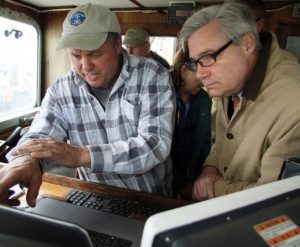
Fishing group’s lawsuit challenges fed review of offshore wind project
A second group has filed a federal lawsuit challenging the government’s approval of the offshore wind project that is expected to generate cleaner electricity for more than 400,000 homes and businesses in Massachusetts starting in late 2023. A coalition of fishing industry groups called the Responsible Offshore Development Alliance petitioned the U.S. Court of Appeals for the First Circuit on Monday to review the Department of the Interior and Bureau of Ocean Energy Management’s approval of the Vineyard Wind I project, arguing that the green light “adds unacceptable risk” to the fishing industry without addressing its long-held concerns. >click to read< 12:18
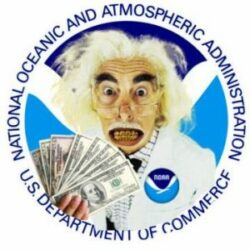
RODA Receives NOAA Fisheries Grant
The Responsible Offshore Development Alliance, a broad membership-based coalition of fishing industry associations and fishing companies, has received an additional $155,000 grant from NOAA Fisheries to conduct a second “Synthesis Of the Science” symposium on floating offshore wind interactions with fisheries. This funding builds upon the $150,000 grant the agency awarded to RODA in 2020 to conduct the first-of-its-kind symposium on the current science regarding fisheries and offshore wind interactions. >click to read< 16:04
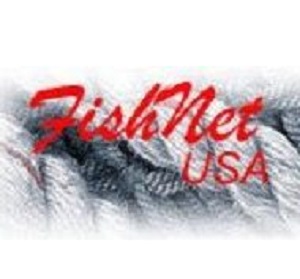
Offshore Wind Farms : We’re from the government and we’re here to _______ you!
It is just another example of the commercial fishing industry being “thrown under the bus” for the benefit of more politically powerful interests-in this case the wind energy industry and the political support that has been generated by it. But then again, perhaps not. Gina McCarthy, described as the Biden Administration’s “Climate Czar” (actually the first-ever climate advisor) “said the administration already took those complaints.” These are the comments RODA and various other folks and organizations made on the COP which were never addressed. “McCarthy said offshore wind is emerging as an even more important linchpin of the Biden administration’s clean energy strategy than had originally been expected. There are about 16 projects currently in the pipeline,,, >click to read< 15:52
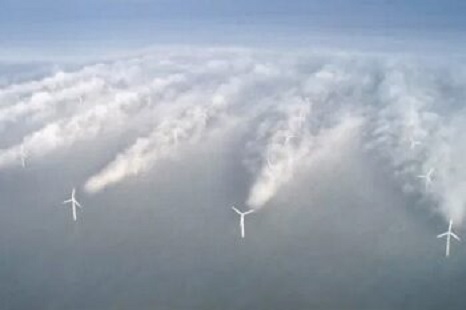
Commercial fishermen being ignored on wind farm projects
For the past three decades, Town Dock fishermen and their counterparts across the Northeast have struggled to stay afloat in the face of strict regulations designed to rebuild depleted stocks of cod, flounder and other species. But now that many of the species have rebounded and government regulators are increasing the amounts of fish they can land, the fishermen face a new threat: offshore wind farms. Longtime Town Dock fisherman Bob Guzzo said the federal government is giving away land that fishermen have used to feed people for more than 300 years. “I’d like to pass this on to someone else who wants to go fishing,” he said. >click to read< 18:54
This comment is excellent-Seems like we can add to the list of lies from big wind, if anyone is keeping score. I would doubt it, their whole industry is based on lies!

RODA Condemns Administration for Putting Goals Ahead of Fishermen Safety
Responsible Offshore Development Alliance (RODA), a broad membership-based coalition of fishing industry associations and fishing companies, condemns in the strongest possible terms the Bureau of Ocean Energy Management’s (BOEM) issuance of a Record of Decision for the previously terminated Vineyard Wind 1 Offshore Wind Energy Project. BOEM continues to abdicate its responsibility to the public and leave all decision making to large, multinational corporations, including this Decision which includes effectively no mitigation measures to offset impacts to critical ocean ecosystems and commercial fisheries. >click to read< 09:21
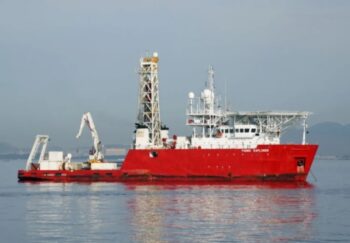
Undersea cable survey marks milestone in Maine’s offshore wind quest
Three marine vessels that study the makeup and geology of seabeds are scheduled to arrive in Maine over the next week or so to survey the proposed route of an underwater cable that will link a floating, offshore wind turbine near Monhegan Island,,, The project received a major boost last August when Diamond Offshore Wind, a subsidiary of Mitsubishi Corp., and RWE Renewables, the world’s second-largest offshore wind company,,, While the location of offshore wind turbines has gotten a lot of attention, the siting of the cables that connect turbines received less scrutiny, according to Annie Hawkins, of RODA, >click to read< 15:25
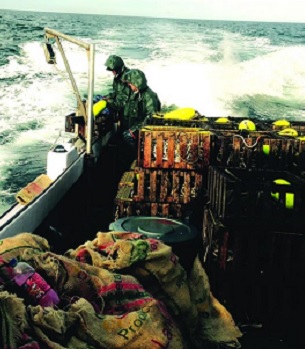
Offshore Wind Farm Threatens Tangier Family’s Conch Fishing Livelihood
A small group of Tangier watermen find themselves competing with Virginia’s biggest power company, Dominion Energy, for natural resources in an area just outside the Chesapeake Bay 27 miles off the coast of Virginia Beach. Dominion Energy is using a 2,135-acre site in federal waters – leased by the Virginia Department of Mines, Minerals, and Energy – for its recently launched Coastal Virginia Offshore Wind Project, a two-turbine, offshore wind test site. >click to read< 15:18
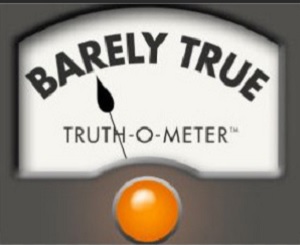
Vineyard Wind sails forward!
Atlantic waters 14 miles south of Martha’s Vineyard are again poised to be the site of a milestone that potentially rivals Pennsylvania’s Oil Creek Valley in U.S. energy significance. The Responsible Offshore Development Alliance (RODA), an advocacy group for fishing interests, along with other fishing organizations, has pushed for four-mile-wide transit lanes through the turbines for safe mobile gear fishing and safe general navigation. In general, fishermen have been the strongest critics of the project. “Vineyard Wind alone will generate at least 3,600 jobs, and reduce costs for ratepayers by an estimated $1.4 billion, according to the Massachusetts Department of Energy Resources,” the letter states. >click to read< 10:57
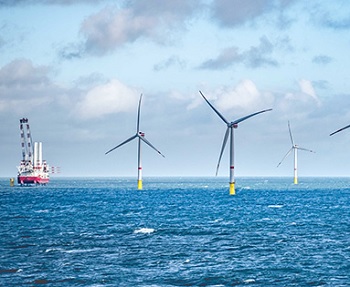
Offshore wind to have major ‘adverse’ effects
Offshore wind farms could have a major “adverse” impact on commercial fisheries, according to a long-awaited analysis from the Interior Department released yesterday. The Bureau of Ocean Energy Management’s draft supplemental environmental review for Vineyard Wind, the first anticipated large-scale wind project in the United States, arrives nearly a year after a final decision on the project was expected. BOEM delayed a final environmental analysis at the eleventh hour last summer and announced the launch of the supplemental review, arguing that the rapid expansion of offshore wind proposals and coastal state wind procurement policies necessitated a broader examination of wind’s foreseeable impacts >click to read< 14:37
RODA Receives NMFS Grant to Convene State of the Science Symposium on Fishing and Offshore Wind Interactions – The Responsible Offshore Development Alliance (RODA) has received a $150,000 grant from the National Marine Fisheries Service (NMFS) to aggregate existing knowledge, then convene a first-of-its-kind symposium on the current science regarding fisheries and offshore wind interactions. The project, “Understanding the State of the Science,” will advance agency, fishing industry, offshore wind energy developer, and public understanding of existing research on interactions between the two industries. >click to read<
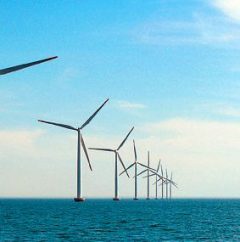
Fishing groups wary of rapid offshore wind development plans
As offshore wind moves up the coast of New England, efforts are underway to make sure the region’s fishing interests have a seat at the table early in project development. An alliance of industry and academic stakeholders is promoting the need for research and best practices as offshore wind takes hold in waters where fishing has long been an economic anchor. Fishing groups have several concerns about the potential for boating obstacles and ecological impacts. A dearth of research makes the industry hesitant as it prepares for a slew of projects that could overwhelm their operations. Above all, fishing stakeholders want to be included from the start of wind project development. >click to read< 09:07

New England: Fishing Industry and offshore windfarmers no closer to finding solutions
The National Marine Fisheries Service and the National Oceanic and Atmospheric Administration, had refused to endorse BOEM’s draft EIS for Vineyard, complaining that fishing concerns were not addressed adequately. This helped trigger the government’s ongoing analysis of offshore wind’s cumulative impacts in the region.,, In public comments on the USCG port-access study, Meghan Lapp, fisheries liaison for frozen fish supplier Seafreeze, a subsidiary of Spain-based conglomerate Grupo Profand, called for the lanes.,, Lapp also called for an assurance of maritime safety that she said would be compromised by radar interference from wind turbines. >click to read< 08:34
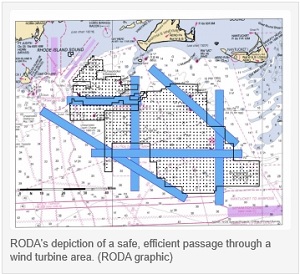
RODA Calls for 4 Nautical Mile Transit Lanes in New England Offshore Wind Areas
Today, RODA submitted a proposal to the U.S. Coast Guard, the Bureau of Ocean Energy Management, and the National Marine Fisheries Service calling for the designation of 4 nm transit lanes through the New England wind energy lease areas. 4 nm transit lanes would preserve safe and efficient passage along the routes most often used by fishermen. >click to read< 08:30
Fishermen call for 4-nautical-mile lanes between offshore wind turbines – >click to read<

Jones Act changes would ‘jeopardise countless US jobs’ in offshore wind
US fisheries advocacy body the Fisheries Survival Fund (FSF) has claimed proposed changes to the Jones Act – requiring that cargo, including wind turbines, shipped between US ports be transported on American-flagged vessels – could cost ‘countless of job opportunities’ to local companies in the rapidly emerging Northeast Atlantic offshore wind sector. “These proposed modifications would place foreign-owned offshore wind energy companies at a unique advantage not afforded to the thousands of US-owned maritime industries, including commercial fisheries,” said FSF counsel David Frulla. “FSF is not submitting this letter to oppose offshore wind energy development in its entirety,, >click to read< 09:21






